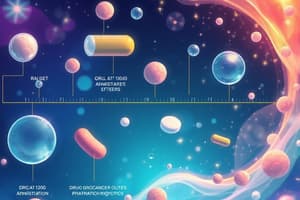Podcast
Questions and Answers
First order kinetics implies that the rate of drug metabolism is constant regardless of the concentration of the drug.
First order kinetics implies that the rate of drug metabolism is constant regardless of the concentration of the drug.
False (B)
What is the primary action of diuretics?
What is the primary action of diuretics?
- Suppress appetite
- Promote urination (correct)
- Increase blood pressure
- Enhance digestion
Name one class of drugs that can treat hypertension.
Name one class of drugs that can treat hypertension.
Renin-angiotensin inhibitors
The _____ is a hormone that regulates calcium levels in the body.
The _____ is a hormone that regulates calcium levels in the body.
Match the following classes of antibiotics with their type:
Match the following classes of antibiotics with their type:
Which of the following is a common neurotransmitter affected by drugs affecting the CNS?
Which of the following is a common neurotransmitter affected by drugs affecting the CNS?
Nonsteroidal anti-inflammatory drugs (NSAIDs) are used to relieve pain and inflammation.
Nonsteroidal anti-inflammatory drugs (NSAIDs) are used to relieve pain and inflammation.
What condition do bronchodilators primarily treat?
What condition do bronchodilators primarily treat?
The process by which drugs are absorbed into the bloodstream is called _____
The process by which drugs are absorbed into the bloodstream is called _____
Which of the following drugs is used for opioid analgesia?
Which of the following drugs is used for opioid analgesia?
Flashcards are hidden until you start studying
Study Notes
General Pharmacology
- Definitions & Concepts: Understand basic terminology and principles surrounding pharmacology.
- Sources of Drugs: Drugs can be derived from natural products, synthetic processes, or biotechnological sources.
- Dosage Forms: Various forms include tablets, capsules, injections, topical preparations, and solutions.
- Routes of Administration: Key routes include oral, intravenous, intramuscular, subcutaneous, inhalational, and topical.
- Pharmacokinetics: Focuses on drug absorption, bioavailability, distribution in the body, metabolism, and excretion.
- First-order Kinetics: The rate of drug elimination is proportional to its concentration.
- Zero-order Kinetics: The rate of drug elimination is constant, regardless of concentration.
- Pharmacodynamics: Examines drug action mechanisms, sites of action, and the body's response to drugs.
- Adverse Drug Reactions: Unwanted effects that may occur due to drugs.
- Margin of Safety: Difference between therapeutic and toxic doses; affected by patient factors.
Drugs Affecting ANS
- Introduction: Understand the autonomic nervous system's role and impacts.
- Parasympathetic Drugs: Focus on cholinergic agents that enhance parasympathetic activity.
- Sympathetic Drugs: Emphasize adrenergic agents that activate sympathetic responses.
Renal and CVS
- Diuretics: Medications that promote renal excretion of water and electrolytes.
- Renin-Angiotensin System: Key in regulating blood pressure and fluid balance; inhibitors help manage hypertension.
- Hypertension Treatment: Utilize various drug classes such as diuretics, ACE inhibitors, and beta-blockers.
- Management of Angina: Treatments may include nitrates, beta-blockers, and calcium channel blockers.
- Myocardial Infarction: Focus on antiplatelet therapy, thrombolytics, and beta-blockers as treatment.
- Heart Failure: Medications include ACE inhibitors, diuretics, and beta-blockers.
- Hypercholesterolemia: Statins and other lipid-lowering agents are critical for management.
Anti-inflammatory Drugs and Related Autacoids
- Histamine & Bradykinin: Examine effects and antagonists that block their actions.
- 5-HT (Serotonin): Roles in mood regulation and gastrointestinal function; study its antagonists.
- Prostaglandins & Leukotrienes: Mediators of inflammation; focus on how NSAIDs inhibit their production.
- Nonsteroidal Anti-inflammatory Drugs (NSAIDs): Commonly used for pain relief and inflammation.
- Antirheumatic Drugs: Target conditions like rheumatoid arthritis.
- Gout Therapy: Medications to reduce uric acid levels and manage pain.
Drugs Affecting CNS
- General Anesthetics: Induce loss of consciousness for surgical procedures.
- Anxiolytics & Hypnotics: Help manage anxiety and promote sleep.
- Alcohol: Commonly abused substance impacting CNS functioning.
- Opioid Analgesics: Effective for pain management but pose risks of dependence.
- Drug Dependence & Abuse: Understand mechanisms and consequences of addiction.
- Antiepileptic Drugs: Manage different types of seizures and epileptic conditions.
- Neurodegenerative Disorder Therapy: Address diseases like Alzheimer's and Parkinson's with specific drugs.
Endocrines
- Calcium Balance: Managed by parathyroid hormone, vitamin D, and calcitonin.
- Thyroid Drugs: Used to treat hypo- and hyperthyroidism.
- Adrenocortical Steroids: Influence a wide range of bodily functions; anabolic steroids promote muscle growth.
- Diabetes Management: Insulin and oral hypoglycemic agents are crucial in managing blood glucose levels.
Drugs Affecting Respiratory System
- Bronchial Asthma: Treatment involves bronchodilators and anti-inflammatory agents.
- COPD Management: Patient care focuses on inhalers and systemic therapies.
Chemotherapy
- Antibiotic Classes:
- Sulfonamides, Penicillins, Cephalosporins: Historical foundations of antibiotic therapy.
- Aminoglycosides, Macrolides, Tetracyclines: Broad spectrum antibiotics used in various infections.
- Tuberculosis and Leprosy: Employ specific medications targeted to these diseases.
- Antiseptics & Disinfectants: Important for infection control in clinical settings.
Miscellaneous Topics
- Stroke Management: Emphasize acute treatment and rehabilitation strategies.
- Toxicology: Understand heavy metal poisoning and antidotes available.
- Pharmacology in Special Populations: Adjustments for pediatric and geriatric patients due to physiological differences.
- Drug Interactions: Be aware of interactions between medications commonly used by physiotherapists.
- Hematinics, Vitamins, and Antioxidants: Study their roles in health and disease management.
Studying That Suits You
Use AI to generate personalized quizzes and flashcards to suit your learning preferences.




